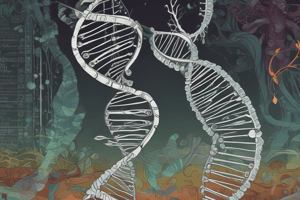Podcast
Questions and Answers
Which statement is scientifically based? (Select all that apply)
Which statement is scientifically based? (Select all that apply)
- All mutations are harmful.
- Mutations rarely occur.
- Mutations are not passed from parent to offspring.
- Some mutations can be contagious, like infections. (correct)
Which best describes genetic mutations? (Select all that apply)
Which best describes genetic mutations? (Select all that apply)
- Some inherited genetic mutations can be good for the offspring. (correct)
- Somatic mutations can be inherited from parents or acquired during life.
- Different genetic mutations cause few forms of cancer.
- Genetic mutations that cause diseases are always passed on to offspring.
Which type of mutation occurs only in reproductive cells?
Which type of mutation occurs only in reproductive cells?
- Frameshift mutation
- Germline mutation (correct)
- Point mutation
- Somatic mutation
The DNA sequence reads ACGTTCATT before a mutation occurs. After the mutation, the DNA sequence reads ATCGTTCATT. Which type of mutation occurred?
The DNA sequence reads ACGTTCATT before a mutation occurs. After the mutation, the DNA sequence reads ATCGTTCATT. Which type of mutation occurred?
Which type of mutation always produces a stop codon?
Which type of mutation always produces a stop codon?
Which type of mutation causes sickle cell anemia?
Which type of mutation causes sickle cell anemia?
Which sentence best shows a frameshift mutation using the following sentence: THE CAT SAW THE RAT?
Which sentence best shows a frameshift mutation using the following sentence: THE CAT SAW THE RAT?
Which type of mutation is responsible for causing Tay-Sachs disease?
Which type of mutation is responsible for causing Tay-Sachs disease?
Based on scientific research, which statement best describes mutations?
Based on scientific research, which statement best describes mutations?
A mutagen is:
A mutagen is:
Flashcards are hidden until you start studying
Study Notes
General Concepts of DNA Mutations
- Mutations can occur in DNA but are generally rare occurrences.
- Not all mutations are harmful; some can be beneficial for offspring.
- Mutations can be inherited or acquired and may vary in their impact.
Types of Mutations
- Germline Mutation: Only occurs in reproductive cells and can be passed from parent to offspring.
- Somatic Mutation: Occurs in non-reproductive cells and cannot be inherited.
- Point Mutation: A change affecting a single base pair; may lead to substitutions of one amino acid for another.
Specific Types of Mutations
- Insertion: Involves adding nucleotides into a DNA sequence, causing a shift in the reading frame, such as in the transition from ACGTTCATT to ATCGTTCATT.
- Deletion: Results in the loss of nucleotides, exemplified in Tay-Sachs disease due to a missing codon affecting enzyme production.
- Missense Mutation: Changes one amino acid in a protein; responsible for conditions like sickle cell anemia where glutamic acid is replaced by valine.
- Nonsense Mutation: Always produces a stop codon, prematurely ending protein synthesis.
Example Applications
- Frameshift Mutation: Alters the reading frame of the genetic code, illustrated by changing the phrase "THE CAT SAW THE RAT" to "THC ATS AWT HER AT."
Impact of Mutations
- Some mutations can lead to serious health conditions, such as sickle cell anemia or Tay-Sachs disease.
- Mutagens are external agents that can induce mutations in DNA, contributing to genetic variability and potential diseases.
Studying That Suits You
Use AI to generate personalized quizzes and flashcards to suit your learning preferences.




